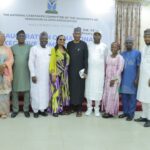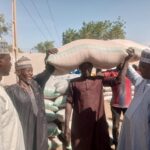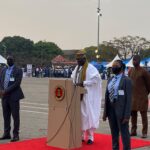By Salif Atojoko
President Bola Tinubu on Thursday inaugurated the Presidential Economic Coordination Council (PECC), mandating it to strengthen the economy.
He also inaugurated the Economic Stabilisation Programme to ensure food security, improved power supply, enhanced social welfare and healthcare, increased energy production, and overall economic transformation.
Speaking during the inaugural of the 31-member Council at the Council Chambers in Abuja, Tinubu, who chairs the Council, underscored the need for innovative solutions to the country’s economic challenges.
He noted the importance of public-private partnerships in driving economic reforms.
“We have the challenge of energy security in Nigeria. We need to work together to improve our oil and gas sector, and we must also increase electricity generation and distribution throughout the country.
“We are determined to do that with your cooperation, collaboration, and recommendations.
“As a nation, it is so shameful that we are still generating 4.5GW of electricity.
“We must increase our oil production to 2 million barrels per day within the next few months and we are determined to remove all entry barriers to investments in the energy sector while enhancing competitiveness.’
He announced measures, which would run concurrently with the National Construction and Household Support Programme, to stabilise the economy, enhance job creation, and foster economic security.
The News Agency of Nigeria (NAN) reports that the measures under the Economic Stabilisation Programme include Energy Security, which includes power, oil and gas, aims to increase on-grid electricity to be delivered to homes and businesses from about 4.5 gigawatts to 6 gigawatts in six months.
It also aims at increasing oil production to two million barrels per day within the next 12 months; and remove barriers to entry for investments into the sector to enhance competitiveness.
The programme includes Agriculture and Food Security, which aims at increase staple crops grown by small-holder farmers from 127 million metric tonnes in 2023 to 135 million metric tonnes this year.
It will bolster production by partnering larger-scale commercial farmers and support qualified farmers with satellite imagery for land use planning, crop rotation, and monitoring of agricultural expansion.
Another aspect of the plan is Health and Social Welfare under which the Federal Government hopes to make essential medicines available at lower cost for 80-90 million Nigerians.
It will also expand healthcare insurance coverage for one million vulnerable people via a Vulnerable Group Fund in collaboration with state governments.
It will redeploy 20,000 healthcare workers to provide services to 10-12 million patients in areas where they are most urgently needed and power up 4,800 primary healthcare centres (PHCs), second tier, and third tier hospitals using renewable energy sources.
Under the Economic Stabilisation Programme, Tinubu said some fiscal measures had been introduced to improve access to finance for the housing sector, MSMEs, and the manufacturing sector are.
The measures include support for new and existing youth-owned enterprises across all 36 states of the Federation, creating 7,400 MSMEs within the next 6-12 months.
There is also MSME support, a N650 billion facility that will provide lower-cost short-term facilities to youth-owned businesses, manufacturers and MSMEs across various industries; food processing, pharmaceutical, agriculture, and wholesale and retail trade.
“This financing will be based on their current and future receivables, company rating, and market demand for products.
“A Manufacturing Stabilisation Fund will rejuvenate up to two hundred and fifty companies and deliver lower cost (9.0 per cent -11.0 per cent) long-term facilities to large, medium-scale, and light manufacturers that produce finished goods for domestic and export markets.
“Sub-national Matching Fund: A Grow Nigeria Development Fund consisting of a single-digit interest rate loan portfolio with the Bank of Industry and a matching fund agreement with sub-national governments to grow MSMEs,” said the President.
He stated that the Bank of Industry’s Rural Development Programme would be expanded to support rural economies by developing 300 new MSMEs for each state, including the Federal Capital Territory, Abuja, resulting in 11,100 new rural-based MSMEs across the Federation.
“Mortgage Finance Acceleration Facility: A facility that delivers affordable housing for all segments impacted by the cost-of-living challenge.
“This will support the construction of an additional 25,000 housing units.
“These fiscal measures will improve access to finance for MSMEs and, in the process, create 4.7 million direct and indirect jobs over a six to 12-month period,” said Tinubu.
Emphasising the significance of the task ahead, Vice-President Kashim Shettima, who is the Vice-Chairman of the Council, stated that President Tinubu was committed to proffering solutions to the nation’s economic challenges and not apportioning blame.
“I want to emphasise that when there is a will, there is always a way, and the President does not believe in apportioning blame. He believes in preparing solutions,” Shettima said.
Mr Wale Edun, the Coordinating Minister of the Economy and Minister of Finance, made a presentation on the highlights of the Accelerated Stabilisation and Advancement Plan earlier submitted to the President.
The plan details economic issues to be resolved in 2024 by sub-committees in the key sectors of agriculture and food security, energy (oil, gas, power), health and social welfare, and business support.
Other members of the council include the Senate President, the Speaker of the House of Representatives, Chairman of the Nigeria Governors Forum, twelve ministers, and the Governor of the Central Bank of Nigeria.
Members from the Organised Private sector include: Alhaji Aliko Dangote, Mr Tony Elumelu, Alhaji Abdul Samad Rabiu, Ms Amina Maina, Mr Segun Ajayi-Kadir, Dr Funke Opeke, Dr Doyin Salami among others. (NAN) (www.nannews.ng)
Edited by Tayo Ikujuni












